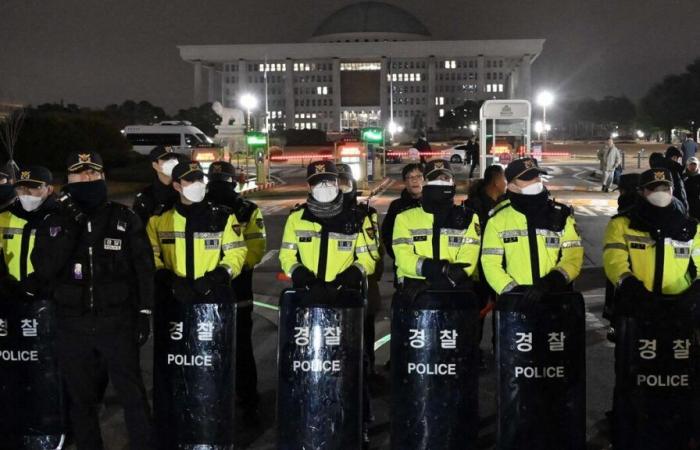
Unheard of since the 1980s. South Korean President Yoon Suk Yeol proclaimed martial law on Tuesday, saying the measure was necessary to protect the country from “North Korean communist forces” in a context of heated parliamentary debate on the budget.
What is martial law?
As indicated in a press release published in the Korean press, the martial law established in South Korea has been in force since this Wednesday at 11 p.m. local time (since 3 p.m. in Paris). The statement said that “all political activities, including activities of the National Assembly, local councils, political parties, political associations, rallies and demonstrations, are prohibited.”
“Any action aimed at denying or attempting to overthrow the liberal democratic system is prohibited, as well as fake news, manipulation of public opinion and false propaganda,” also indicates the text, which adds that “all media and publications are controlled by martial law. Also prohibited are “strikes, sabotage and assembly activities that encourage social chaos”.
At the same time, “all medical staff”, some of whom were on strike, “must return to their usual duties within 48 hours and work faithfully”. “Violators of the above proclamation may be arrested, detained, searched and seized without a warrant,” and “will be punished,” local authorities warn.
Why did the Korean president declare martial law?
In a surprise televised address, President Yoon Suk Yeol said he wanted to “protect liberal South Korea from threats posed by North Korean communist forces and eliminate elements hostile to the state.” “Without concern for the livelihood of the people, the opposition party has paralyzed the government, for the purposes of impeachments, special investigations and to protect its leader from legal prosecution,” said the conservative president.
The move comes as Yoon Suk Yeol's People Power Party continues to battle with the main opposition Democratic Party over next year's proposed budget. Opposition MPs approved a significantly reduced budget program last week through a committee.
“Our National Assembly has become a refuge for criminals, a den of legislative dictatorship that seeks to paralyze the administrative and judicial systems and overthrow our liberal democratic order,” the president said. He accused the elected representatives of the opposition of cutting “all budgets essential to the primary functions of the nation which are the fight against drug-related crimes and the maintenance of public security (…) transforming the country into a paradise of drugs and in a place of chaos for public safety.”
Yoon Suk Yeol went on to call the opposition, which holds a majority in Parliament, “forces hostile to the state intent on overthrowing the regime.” He assured that his decision was “inevitable”.
What does the Korean opposition say?
Shortly after the announcement, opposition leader Lee Jae-myung, who narrowly lost to Yoon in the 2022 presidential election, called Yoon's announcement “illegal” and ” invalid “. “Come to the National Assembly now. I am going there too,” he added, urging citizens to join him in opposing martial law.
What are the consequences on the ground?
Martial law was quickly applied on the ground, according to the South Korean Yonhap news agency, which indicates that the country's parliament, based in Seoul, was placed under seal. Helicopters even landed on its roof, according to live images broadcast by television channels.
South Korean television later showed footage of special forces entering Parliament.
What reactions internationally?
Shortly after President Yoon's announcement, the United States said it was “monitoring the situation” in South Korea “closely.” The American government “is in contact with the government of the Republic of Korea,” Washington said in a statement, a spokesperson for the White House National Security Council. In China, Beijing has called on its fellow citizens in South Korea to be “cautious”.





